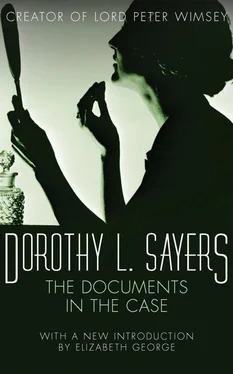Dorothy Sayers - The Documents in the Case
Здесь есть возможность читать онлайн «Dorothy Sayers - The Documents in the Case» весь текст электронной книги совершенно бесплатно (целиком полную версию без сокращений). В некоторых случаях можно слушать аудио, скачать через торрент в формате fb2 и присутствует краткое содержание. Жанр: Классический детектив, на английском языке. Описание произведения, (предисловие) а так же отзывы посетителей доступны на портале библиотеки ЛибКат.
- Название:The Documents in the Case
- Автор:
- Жанр:
- Год:неизвестен
- ISBN:нет данных
- Рейтинг книги:5 / 5. Голосов: 1
-
Избранное:Добавить в избранное
- Отзывы:
-
Ваша оценка:
- 100
- 1
- 2
- 3
- 4
- 5
The Documents in the Case: краткое содержание, описание и аннотация
Предлагаем к чтению аннотацию, описание, краткое содержание или предисловие (зависит от того, что написал сам автор книги «The Documents in the Case»). Если вы не нашли необходимую информацию о книге — напишите в комментариях, мы постараемся отыскать её.
The Documents in the Case — читать онлайн бесплатно полную книгу (весь текст) целиком
Ниже представлен текст книги, разбитый по страницам. Система сохранения места последней прочитанной страницы, позволяет с удобством читать онлайн бесплатно книгу «The Documents in the Case», без необходимости каждый раз заново искать на чём Вы остановились. Поставьте закладку, и сможете в любой момент перейти на страницу, на которой закончили чтение.
Интервал:
Закладка:
I’ve had a letter from Merritt — he ‘has read the book with much interest and would be glad if I could find time to call and discuss it with him at my convenience’. First time anybody’s even offered to discuss it. I suppose that if I will consent to cut out all the ‘advanced’ passages, and ‘brighten’ the style and give it a more ‘satisfactory’ ending, he will consider doing something with it. Well, he won’t get the chance, that’s all.
Thank heaven, the Life is practically finished with. I’m thankful to get rid of it. It has led me into reading a lot of scientific and metaphysical tripe which is of no use to anybody, and least of all to a creative writer (a fact I have taken delight in rubbing in, in the course of the work!) And the further you go with it, the worse it gets. Lucretius could make great poetry out of science, and Bacon got some good work in on it — and even Tennyson could screw some fine lines out of an unsound theory of evolution and perfectibility and all the rest of it. But now, oh, heavens! after the bio-chemist, the mathematician. What can you make out of the action of the glands of internal secretion upon metabolism, or Pi and the square root of minus one? Despair and a kind of gloomy grubbiness, that’s all. I’d rather have a Miltonian theology to make poetry of than all this business of liver and gonads and the velocity of light. Perry the parson gets out of it by pretending that the Catholic Church knew all about it from the beginning, and that inaccurate theological metaphors can be interpreted as pseudo-scientific formulae, which is a lie. The origin of life is our great stamping-ground for discussion. You can’t make life synthetically in a laboratory — therefore he deduces that it came by divine interference! Rather an assumption! But, after all, he is little worse than the man of science. ‘In some way or other, life came,’ they say. ‘Sometime, somehow, we may learn how to make it.’ But even if one could learn to make it, that doesn’t account for its having arrived spontaneously in the first place. The biologist can push it back to the original protist, and the chemist can push it back to the crystal, but none of them touch the real question of why or how the thing began at all. The astronomer goes back untold millions of years and ends in gas and emptiness, and then the mathematician sweeps the whole cosmos into unreality and leaves one with mind as the only thing of which we have any immediate apprehension. Cogito, ergo sum, ergo omnia esse videntur . All this bother, and we are no further than Descartes. Have you noticed that the astronomers and mathematicians are much the most cheerful people of the lot? I suppose that perpetually contemplating things on so vast a scale makes them feel either that it doesn’t matter a hoot anyway, or that anything so large and elaborate must have some sense in it somewhere.
I wish I had Lathom’s robust contempt for all this kind of thing. His attitude is that bio-chemistry cannot affect his life or his art, so let them get on with it. I am tossed about with every wind of doctrine, and if I’m not damn careful I shall end by writing a Point Counterpoint , without the wit. You can’t really make a novel hold together if you don’t believe in causation.
Said a rising young author, ‘What, what?If I think that causation is not,No word of my textWill bear on the nextAnd what will become of the plot?’
Perhaps this accounts for my never having been able to produce a book with a plot — except, of course, the one Merritt wants to see me about. And that was a sort of freak book.
Well, never mind. Only a fortnight now and I shall be seeing you. Praise God (or whatever it is) from (if direction exists) whom (if personality exists) all blessings (if that word corresponds to any percept of objective reality) flow (if Heraclitus and Bergson and Einstein are correct in stating that everything is more or less flowing about).Your ever faithful Jack
23. The Same to the Same
4.12.28
Bungie Dearest,
Just a line to say that the unexpected has happened! Merritt is all over the book!!! Thinks it’s the biggest thing that ever happened, and has offered me a first-class contract (£100 advance, 10 %, to 500, 15 % to 1,000 and 20 % thereafter, with a firm offer for the next two beginning at top previous rate), on condition he can get it into print instanter to publish before the end of Jan. The man’s as mad as a hatter!
I nearly sent round to get him certified, but instead found myself accepting the terms. When you consider the frightful flop Deadlock was, you realise that the thing is sheer stark raving madness, but who cares?
Damn it, I always believed there was something in the book, but I thought I was a fool to think so. But how can he ever imagine that it will sell !. . But that’s his funeral.
He says it must have a new title. Try and think of something that will look well on a jacket, there’s an ingenious cherub. It’s fearfully urgent, because he’s got to get his travellers out with it at the beginning of next month.
Lathom’s portrait of Miss Milsom is the wickedest piece of satire you ever saw. She, fortunately, does not see it at all. In fact, she lugged up the parson to have a look at it yesterday. Perry, though a parson, is no fool. He looked grave, said that it was a striking picture, and added that Mr Lathom had a great gift which should be put to great uses. Lathom grinned, and Miss Milsom began to babble about the Academy and Mrs Harrison’s portrait, at which Perry looked graver still. I suppose he thinks that idiots should be charitably protected from themselves. Lathom is in wild spirits and is working like something inspired. O si sic omnes , meaning me!
Jim reports that he is toiling away like stink and really sticking to it. I hope so. He will be at home when term ends, so you will meet the white-headed boy of the family. I trust you will be able to bear with us all. He is inflicting on us a friend of his who went down from Caius this year — man called Leader — one of those infernally high-spirited youths who bounce all over the shop like Airedale puppies — he rouses all my worst instincts, but is perfectly harmless. He is now in London, at St Anthony’s College of Medicine, and I suppose one of these days he will muddle through his hospital work and be turned out as a genial G.P. — ‘Dr Leader is such a nice, cheerful man; he makes you feel better the minute he comes into the room.’ I hate cheerful people. Still, he and Jimmy will amuse one another, and we shall have a chance to get off on our own a bit.
Bless you, Bungie! I am counting the days till we meet.Your own Jack
24. George Harrison to Paul Harrison
15, Whittington Terrace, Bayswater 20th December, 1928
My dear boy,
A line at Christmas-time to send our best love, and to say that all our thoughts are with you. Next Christmas, if all goes well, we shall have you back, and things will seem more like themselves. Here, of course, a sad shadow is cast on our festivities by the illness of the King. There are distressing rumours, but I feel a great confidence that he will pull through in the end.
In spite of this feeling of depression and anxiety, we have decided to make a little jaunt over to Paris. Margaret has seemed rather restless lately, and I think this small excitement will do her good. I am such a quiet sort of old fellow, that I fear she finds her life a trifle dull at times. A visit to the ‘gay city’ will set her up again, and it will be beneficial to me, too, to be shaken out of my rut. We shall be staying at the Hotel Victoria-Palace in the Rue —; it is a pleasant, respectable place, and not dear, as Paris hotels go. We shall do a theatre or two and perhaps go up to Montmartre to see the ‘night-life’ one hears so much about. Young Lathom says he may be running over to Paris for a few days, and, if so, will look us up and show us round the town. It is kind and attentive of him, and we shall appreciate having an up-to-date cicerone, for my own memories of Paris are very antiquated, and I expect everything is very much changed.
Читать дальшеИнтервал:
Закладка:
Похожие книги на «The Documents in the Case»
Представляем Вашему вниманию похожие книги на «The Documents in the Case» списком для выбора. Мы отобрали схожую по названию и смыслу литературу в надежде предоставить читателям больше вариантов отыскать новые, интересные, ещё непрочитанные произведения.
Обсуждение, отзывы о книге «The Documents in the Case» и просто собственные мнения читателей. Оставьте ваши комментарии, напишите, что Вы думаете о произведении, его смысле или главных героях. Укажите что конкретно понравилось, а что нет, и почему Вы так считаете.












